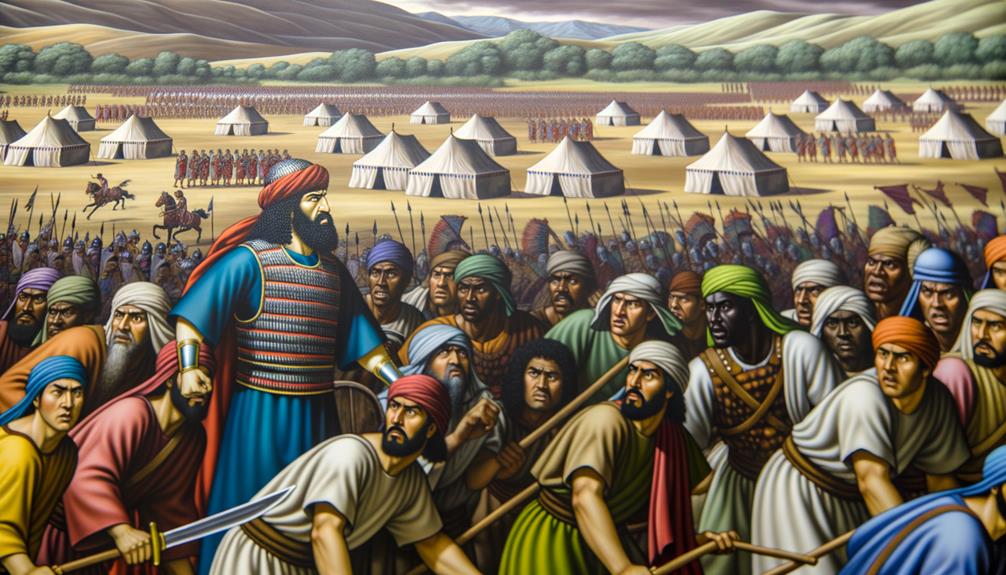Joab Meaning In The Bible: Warrior and Strategist
Joab, son of Zeruiah and nephew of King David, is a pivotal yet controversial figure in the Old Scriptures. As commander of David’s army, he exemplified military acumen by leading critical campaigns, including the capture of Jerusalem.
His fierce loyalty to David contributed to the stability of the kingdom but also saw him embroiled in morally complex actions, such as the killings of Abner, Amasa, and arranging Uriah’s death. This duality of loyalty and ruthlessness creates a nuanced legacy that both supports and questions the ethical dimensions of leadership in biblical Israel.
To explore this complexity further, consider his detailed impact on David’s reign.

Joab Meaning in the Bible: Role, Character, and Spiritual Lessons
| Aspect | Details |
|---|---|
| Name | Joab (Hebrew: יוֹאָב) |
| Meaning | “The Lord is Father” or “Yahweh is Father” |
| Biblical References | 2 Samuel, 1 Kings, 1 Chronicles |
| Role | Commander of King David’s army |
| Key Actions | Victories in battle, political involvement, controversial killings |
| Relationship to David | Nephew and loyal military leader |
| Spiritual Symbolism | Loyalty, justice vs. ambition, consequences of disobedience |
Joab’s Early Life

Joab, a prominent figure in the biblical narrative, was the son of Zeruiah, the sister of King David, situating him within the royal lineage of Israel. This familial connection afforded Joab unique proximity to the epicenter of Israelite power.
His early life, though not extensively documented, is inferred to have been shaped by the political and military milieu of David’s ascension. Growing up during David’s struggle against Saul, Joab likely acquired a nuanced understanding of the complexities of leadership and warfare.
This formative period was essential in developing his strategic acumen and loyalty to David. Joab’s early experiences therefore laid the groundwork for his significant, albeit controversial, role in the unfolding narrative of Israel’s monarchy.
Military Leadership

As the commander of King David’s army, Joab demonstrated exceptional military prowess and strategic insight, greatly shaping the military fortunes of Israel.
His leadership during key battles, including the capture of Jerusalem and the defeat of the Ammonites, underscored his tactical acumen.
Joab’s ability to orchestrate complex military maneuvers, such as flanking movements and surprise attacks, was instrumental in securing victories that expanded and solidified Israel’s territorial gains.
Additionally, his disciplined approach to warfare and his effective management of troops contributed considerably to maintaining the army’s operational readiness.
Joab’s tenure as commander not only reflects his personal capabilities but also highlights the broader military strategies that were pivotal in establishing Israel’s dominance in the region.
Loyalty to King David

Displaying unwavering allegiance, Joab’s loyalty to King David was both a defining characteristic of his career and a crucial element in the stability of David’s reign.
Joab’s dedication to the king was evident through his steadfast support in numerous military campaigns and political crises. His ability to navigate complex situations, including internal rebellions and external threats, reinforced David’s position on the throne.
Additionally, Joab’s loyalty was not merely personal but also strategic, ensuring the continuity of Davidic rule and the consolidation of the kingdom of Israel.
This loyalty, however, was multifaceted and often intersected with Joab’s own interests and perceptions of justice, contributing to the nuanced legacy of his relationship with David.
Controversial Actions

In his role as commander, several of Joab’s actions sparked controversy and debate, raising questions about his methods and motivations.
Significantly, Joab’s killing of Abner, who sought to reconcile with King David, was seen as a politically motivated act masked by personal vengeance for his brother Asahel’s death.
In addition, his assassination of Amasa, another military rival appointed by David, underscores his ruthless streak.
Joab also played a vital role in orchestrating Uriah’s death to cover up King David’s affair with Bathsheba, reflecting his complex loyalty and moral ambiguity.
These actions, while ensuring military success and loyalty to David, often led to ethical dilemmas and conflicts with the broader moral and legal norms of the time.
Legacy and Lessons

Joab’s controversial actions left a complex legacy that provides valuable lessons on leadership, morality, and the intricate balance of power within biblical narratives.
His unwavering loyalty to King David, juxtaposed with his ruthless methods, underscores the ethical dilemmas faced by leaders. Joab’s decisive but brutal tactics in warfare and political maneuvering reveal the high stakes of maintaining authority and order.
His story invites reflection on the consequences of prioritizing power over principle, highlighting the moral ambiguities inherent in governance. Moreover, his ultimate fall from grace serves as a cautionary tale about the limits of loyalty and the importance of ethical integrity.
Conclusion
Joab remains a complex figure in biblical narratives, embodying both valor and moral ambiguity. His military acumen and unwavering loyalty to King David secured his place in Israel’s history, yet his controversial actions, including politically motivated killings, invite scrutiny.
The multifaceted nature of Joab’s legacy underscores the intricate interplay between duty and ethics. Investigating the theory that Joab’s actions were driven by pragmatic loyalty rather than mere ambition provides a nuanced understanding of his role and influence.






